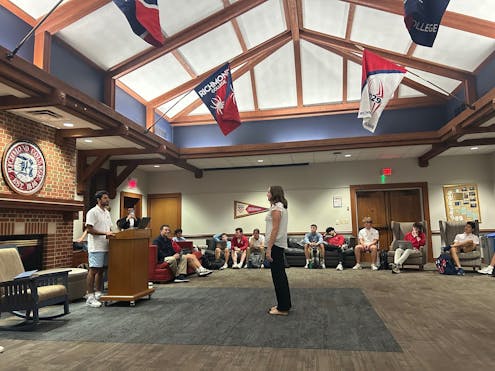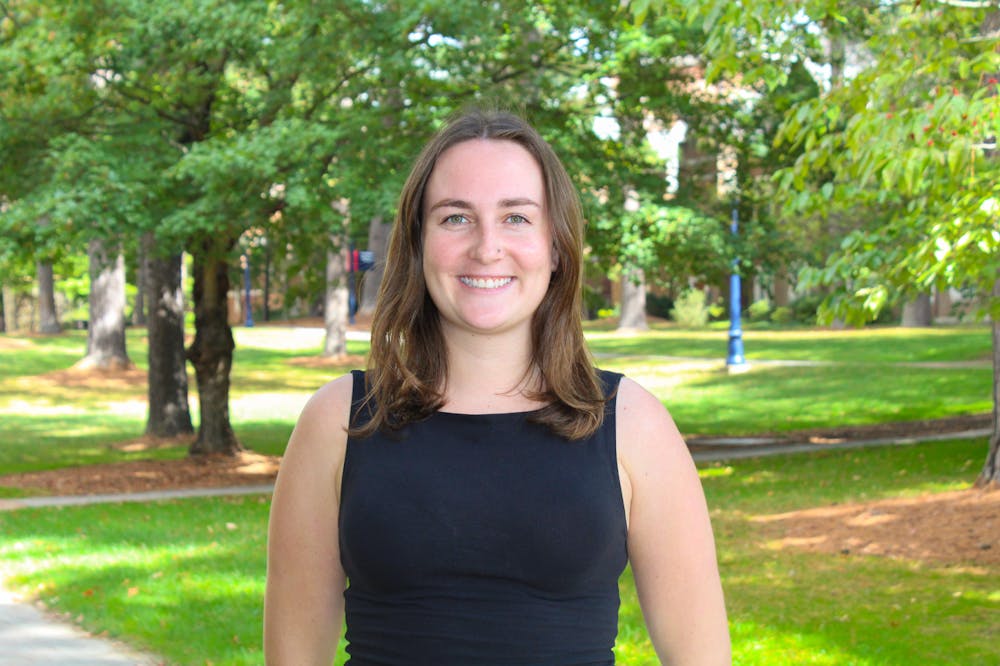On Wednesday, Nov. 12, 23 Richmond College Student Government members gathered in a circle inside the Whitehurst Living Room for a weekly meeting. The energy was initially stiff. Roll was called. A guest speaker gave a talk. A handful of senators typed away on their laptops. Others stared intently at the wall or their phones. In the midst of mundane “save the date” announcements and “dietary restriction” requests, RCSGA senator Emma McCauley’s voice stood out.
It was the only female voice in the room.
She joked with the other RCSGA senators sitting around her, offered ideas during the open discussion time and joined in debate around proposed amendments. She seemed at home, even though her presence was subversive, an affront to a century-old UR tradition of separating students by gender.
“I can represent the college and its values even when I don’t look like everyone else I’m sitting in the room with,” she said.
Since McCauley, a senior from Jacksonville, Fla., became aware of the University of Richmond’s two-college system, she questioned its existence.
Now she has single-handedly changed it.
Richmond College was founded in 1840 for males only. In 1898, the first four women were admitted as day students at the petition of then-president Frederic Boatwright. Later in 1911, Boatwright established a nearly autonomous women’s college, which, in 1914, six years before women gained the right to vote, became Westhampton College. The quarter-mile-long Westhampton Lake served as a physical barrier between the two.
Classes have long since been integrated, but the colleges continue to operate with separate deaneries, student governments and traditions such as Proclamation and Investiture.
McCauley began learning more about the two colleges during her sophomore year, particularly in her leadership classes, where there were frequent discussions about the legitimacy of the separate colleges.
“I know in the past, people have said it gives different chances for leadership opportunities, especially for women,” McCauley said. “But I think that’s not great because that’s just saying if women were running against men, they couldn’t have a chance to win, which I think is foolish.”
McCauley cited tradition as the main reason the system of separate colleges has remained. She said the school is trying to preserve its history, and that while she recognizes the benefits of students having different deans to go to for diverse perspectives, she disagrees with how the colleges are assigned.
“I think it should be a lot more in line with what environment you feel more comfortable in and what values you align with, rather than ‘Oh, your birth certificate says this is your biological sex, then this is the school you enroll in’,” she said.
Enjoy what you're reading?
Signup for our newsletter
For decades, UR students have debated the purpose and utility of this system.
In a 1990 op-ed published in the Collegian, the coordinate system was criticized for being too rigid and binary. Jay Carter, ‘91, wrote that the unique needs of men and women could be addressed without the use of constructed single-sex social environments.
“As a somewhat unrelated point, I believe the coordinate system also inhibits the diversity UR claims to aspire to,” Carter wrote. “As long as men and women are separated, many ‘alternative’ students will reject UR for just that reason.”
In another op-ed published the same year, Brent Damrow, ‘91, praised the coordinate system as “UR’s greatest asset”. He credited the system with fostering a sense of community and tradition within each college.
“Instead, the system is a neutral one, designed not to imply the inferiority of either sex, but to enhance the experiences and to help more completely fulfill the unique needs of both,” Damrow wrote.

Freshmen signing the Honor Pledge at Proclamation, a Westhampton College tradition, on Sept. 21, 1989.
The idea of switching from Westhampton to Richmond College took root during McCauley’s junior year. When she became a senior, she said she felt it was finally time to act.
“I’d kind of been beating myself up over it,” she said. “I thought, why am I asking myself what if, when I can answer my own question?”
To begin the process, she had to meet with the Dean of Richmond College, Joe Boehman. She said he asked her why she wanted to switch, why she felt it was necessary, especially this late in her college career and how the switch would benefit her and those around her.
“I could definitely tell I was a source of confusion in a way. I could see the surprise on his face,” she said. “But it [the approval process] wasn’t too difficult.”
McCauley isn’t the first to attempt to make this switch.
In March 2020, senior Eliana Fleischer wrote an op-ed detailing why she tried to switch colleges and was denied by Boehman. According to Fleischer, Boehman said he would not allow her to affiliate with Richmond College because her reason for switching was an act of protest.
“I tried to switch colleges to demonstrate that the system itself is flawed,” Fleischer wrote. “But if Richmond College really isn’t just for men, why do I need any particularly good reason to join? If the system is no longer bound by its history of gender separation, shouldn’t I be able to choose a college without scrutiny of my reasoning?”
Boehman spoke to the Collegian on the record about McCauley's election and the validity of Fleischer’s statements. He acknowledged that he denied Fleischer’s request to switch but said he could not recall denying it for the reasons she stated in her op-ed. He later asked the Collegian, in an email, not to quote his comments about McCauley or the 2020 op-ed.
Once the switch was approved for McCauley, she became eligible to run for a senator position on RCSGA.
The Collegian reported on McCauley’s historic election in September, which drew both praise and criticism on social media.
“Idk rubs me the wrong way to switch your school senior year just to become the first woman senator-if you wanted to be in Richmond College, then declare there from the start,” one user on Fizz wrote, receiving almost 300 upvotes.
Comments to the article were more positive on Instagram. They applauded McCauley for being courageous and “cool”.
“Is UR getting rid of the gender segregated colleges?” one user wrote. “Is this a step towards abolishing that?”
Reactions within the Richmond College Senate were largely welcoming, McCauley said, with a few exceptions.
“I could guarantee that there were a few individuals who were unhappy, because when you walk into a room and people are upset, you can feel it; I could feel around 30 eyes on me, and some [eyes] weren’t smiling behind them,” she said.
RCSGA President Senior Sassan Fahim commended McCauley for her switch. He said it takes courage to do what she did.
“I’m just excited to have her and hope that she can do good on this body, just like everybody else,” he said.

McCauley being sworn in by RCSGA President, Sassan Fahim, on Sept. 24, 2025.
Senior James Conley, a RCSGA senator and friend of McCauley, initially encouraged her to run for senator and thinks highly of her election.
“Obviously, not all reactions to Emma's election as the first female senator of RC were entirely positive across the campus,” Conley wrote in an email to the Collegian. “Nonetheless, a majority of the student population is proud of Emma being part of such a unique and historical change. Overall, this will move the University in a much more diverse and inclusive direction.”
McCauley acknowledged that she could have been more involved in the Westhampton Student Government before her switch to Richmond College.
She said the idea that anyone can join feels more realistic at Westhampton College because there’s a larger student population outside the gender binary. She said what she would like to see accomplished by Richmond College has already been achieved by Westhampton College.
“It was easier for me in Westhampton College to sit back and be a follower,” McCauley said. “I think in Richmond College…it was somewhere in which I thought stepping up as a leader, I would be able to make more of an impact for myself and those whom I would be leading.”
She said she hopes to break down the wall between the two colleges further to encourage more movement.
When asked how many students outside the gender binary existed within the two colleges, Boehman and Mia Reinoso Genoni, Dean of Westhampton College, wrote in an email to the Collegian that privacy rules under FERPA prevent the release of information regarding gender.
“Granted, I don’t want kids just hopping back and forth as they please, but if students do feel like that divide is what’s been holding them back from switching colleges, I want there to be less of that holdback,” McCauley said.
For McCauley, the biggest thing she wants to accomplish through her historic win is to establish the idea that anyone can join and represent the college of their choice. She views her victory as the biggest hurdle, and said there’s only more to come.
“I hope that my effort and its nonacceptance make you think twice about the system as it stands today, and perhaps how it should change,” Eliana Fleischer wrote five years ago. While Fleischer's request to switch was denied, the system has changed.
McCauley’s win is proof and she wants the change to continue beyond her.
“I don’t want to be the first person who did it, and it stays at the first; I think a leader needs followers to be an adequate leader,” McCauley said.
Contact features editor Grace Randolph at grace.randolph@richmond.edu
Support independent student media
You can make a tax-deductible donation by clicking the button below, which takes you to our secure PayPal account. The page is set up to receive contributions in whatever amount you designate. We look forward to using the money we raise to further our mission of providing honest and accurate information to students, faculty, staff, alumni and others in the general public.
Donate Now



